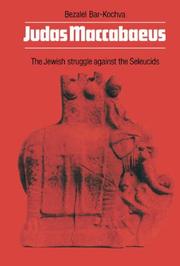| Listing 1 - 5 of 5 |
Sort by
|
Book
ISBN: 9780520253360 0520253361 0520290844 9786612463204 1282463209 0520943635 9780520943636 9781282463202 6612463201 Year: 2010 Publisher: Berkeley University of California Press
Abstract | Keywords | Export | Availability | Bookmark
 Loading...
Loading...Choose an application
- Reference Manager
- EndNote
- RefWorks (Direct export to RefWorks)
This landmark contribution to ongoing debates about perceptions of the Jews in antiquity examines the attitudes of Greek writers of the Hellenistic period toward the Jewish people. Among the leading Greek intellectuals who devoted special attention to the Jews were Theophrastus (the successor of Aristotle), Hecataeus of Abdera (the father of "scientific" ethnography), and Apollonius Molon (probably the greatest rhetorician of the Hellenistic world). Bezalel Bar-Kochva examines the references of these writers and others to the Jews in light of their literary output and personal background; their religious, social, and political views; their literary and stylistic methods; ethnographic stereotypes current at the time; and more.
Greek literature, Hellenistic --- Jews in literature. --- History and criticism. --- Juifs dans la littérature --- Littérature grecque hellénistique --- Histoire et critique --- Jews in literature --- History and criticism --- apollonius molon. --- bezalel bar kochva. --- discussion books. --- greek culture. --- greek history. --- greek intellectuals. --- greek literature. --- greek writers. --- hecataeus of abdera. --- hellenistic period. --- historical jews. --- history buffs. --- jewish culture. --- jewish people. --- jewish representation. --- jews in literature. --- literary references. --- literary style. --- literary. --- perceptions of jews. --- political views. --- religious backgrounds. --- religious history. --- rhetoric. --- scientific ethnography. --- social connections. --- stereotypes. --- theophrastus.

ISBN: 0521323525 0521016835 0511518528 9780521323529 9780511518522 9780521016834 Year: 1989 Publisher: Cambridge Cambridge University Press
Abstract | Keywords | Export | Availability | Bookmark
 Loading...
Loading...Choose an application
- Reference Manager
- EndNote
- RefWorks (Direct export to RefWorks)
This book is an account of the battles fought by Judas Maccabeus between 166 and 160 B.C. against the forces of the Seleucids during the revolt of the Jews against domination by the Seleucid empire. It reexamines the accepted assessments of Judas Maccabeus' activities and achievements and seeks to reconstruct the course of the military and political events of his time. Part I examines the composition and strength of the armies on both sides, their armaments and operating methods, and discusses the extent of Judas Maccabeus' success. Following an introduction evaluating the Jewish writings from all points of view, Part II gives detailed accounts of the battles, including the terrain and the tactics employed, analysing and commenting on the relevant narratives from the Book of Maccabees. Numerous appendices discuss individual problems vital to the reconstruction of the historical developments.
Jews --- Seleucids --- History --- Kings and rulers --- Biography --- 933.322 --- 222.9 --- -Jews --- -Seleucids --- Hebrews --- Israelites --- Jewish people --- Jewry --- Judaic people --- Judaists --- Ethnology --- Religious adherents --- Semites --- Judaism --- Geschiedenis van het Joodse volk: Makkabese opstand--(167-164 v.Chr.) --- Makkabeeën --- -Kings and rulers --- -Biography --- Judas Maccabeus --- -Military leadership --- Palestine --- -Syria --- Holy Land --- History, Military --- History, Military. --- 933.322 Geschiedenis van het Joodse volk: Makkabese opstand--(167-164 v.Chr.) --- Kings and rulers&delete& --- Judas, --- Judah, --- Judas Maccabaeus, --- Maccabaeus, Judas, --- Maccabee, Judah, --- Maccabeus, Judas, --- Machabee, Judas, --- Makabi, Yehudah ha-, --- Yehudah, --- יהודה, --- Military leadership. --- Syria --- Sirii︠a︡ --- Iqlīm al-Sūrī (United Arab Republic) --- Iqlīm al-Shamālī (United Arab Republic) --- Syrian Region (United Arab Republic) --- سوريا --- Sūriyā --- Jumhūrīyah al-ʻArabīyah al-Sūrīyah --- Syrian Arab Republic --- République arabe syrienne --- Sowria --- Syrie --- R.A.S. --- RAS --- Ittiḥād al-Duwal al-Sūrīyah --- Fédération des États de Syrie --- Syrische Arabische Republik --- SAR --- Suryah --- Arabska Republika Syryjska --- Syrien --- Jumhuriya al-Arabya as-Suriya --- Repubblica Araba Siriana --- جمهورية العربية السورية --- Jumhūriyyah al-ʻArabiyyah as-Sūriyyah --- Сірыя --- Siryi︠a︡ --- Сірыйская Арабская Рэспубліка --- Siryĭskai︠a︡ Arabskai︠a︡ Rėspublika --- Сирийската арабска република --- Siriĭskata arabska republika --- Συρία --- Αραβική Δημοκρατία της Συρίας --- Aravikē Dēmokratia tēs Syrias --- 시리아 --- Siria --- סוריה --- רפובליקה הערבית הסורית --- Republiḳah ha-ʻArvit ha-Surit --- シリア --- Shiria --- Сирия --- Сирийская Арабская Республика --- Siriĭskai︠a︡ Arabskai︠a︡ Respublika --- Сирія --- Syrii︠a︡ --- Сирійська Арабська республіка --- Syriĭsʹka Arabsʹka respublika --- 敘利亞 --- Xuliya --- United Arab Republic --- Arts and Humanities --- Jews - History - 168 B.C.-135 A.D. --- Jews - Kings and rulers - Biography --- Seleucids.

ISBN: 0520200594 0585087059 Year: 1996 Volume: 21 Publisher: Berkeley : University of California Press,
Abstract | Keywords | Export | Availability | Bookmark
 Loading...
Loading...Choose an application
- Reference Manager
- EndNote
- RefWorks (Direct export to RefWorks)
Jews --- Greek literature --- Judaism and literature --- Regions & Countries - Asia & the Middle East --- History & Archaeology --- Middle East --- History --- Historiography. --- Jewish authors --- History and criticism. --- Historiography --- History and criticism --- Josephus, Flavius. --- -Jews --- -Hebrews --- Israelites --- Jewish people --- Jewry --- Judaic people --- Judaists --- Ethnology --- Religious adherents --- Semites --- Judaism --- Balkan literature --- Byzantine literature --- Classical literature --- Classical philology --- Greek philology --- -History and criticism --- -Historiography --- Josephus, Flavius --- -Jewish authors --- Josephus Historicus --- Flavius Josephus --- Flavius Iosephus --- Iosephus, Flavius --- Iosephus Historicus --- Literature and Judaism --- Hebrews --- Jewish authors&delete& --- History&delete& --- Literature

ISBN: 0521206677 0521200083 0511665725 9780521206679 9780511665721 9780521200080 Year: 1976 Volume: *72 Publisher: Cambridge ; London ; Melbourne : Cambridge Univ. Press,
Abstract | Keywords | Export | Availability | Bookmark
 Loading...
Loading...Choose an application
- Reference Manager
- EndNote
- RefWorks (Direct export to RefWorks)
This is a 1976 study of the organization and tactics of the Seleucid armies from 312 to 129 BC. The first part of the book discusses the numerical strength of the armies, their sources of manpower, the contingents of the regular army, their equipment and historical development, the chain of command, training and discipline. The second part reconstructs the great campaigns in order to examine the Seleucid tactics. The book provides a lesson in Hellenistic and military history and discusses several questions: how did the Hellenistic armies develop after Alexander? What distinguished the Seleucid army as superior to its Hellenistic contemporaries? The answers illuminate the expansion of Hellenism as we learn how the Seleucid army was used as a military, social and cultural instrument to impose the rule of the dynasty over the vast regions of the Empire and how it helped to shape Hellenistic society in the East.
Seleucids --- Séleucides --- -Military history, Ancient --- Seleucids. --- Séleucides --- Military art and science --- Military history, Ancient --- Ancient military history --- Military history --- Naval history --- History --- Military history, Ancient. --- History. --- Art et science militaires --- Histoire militaire ancienne --- Histoire --- Arts and Humanities --- Military art and science - History --- Armées --- Défense --- Histoire militaire --- Armées --- Défense
Book
ISBN: 9780520290846 Year: 2016 Publisher: Berkeley ; Los Angeles ; London University of California Press
Abstract | Keywords | Export | Availability | Bookmark
 Loading...
Loading...Choose an application
- Reference Manager
- EndNote
- RefWorks (Direct export to RefWorks)
| Listing 1 - 5 of 5 |
Sort by
|

 Search
Search Feedback
Feedback About UniCat
About UniCat  Help
Help News
News